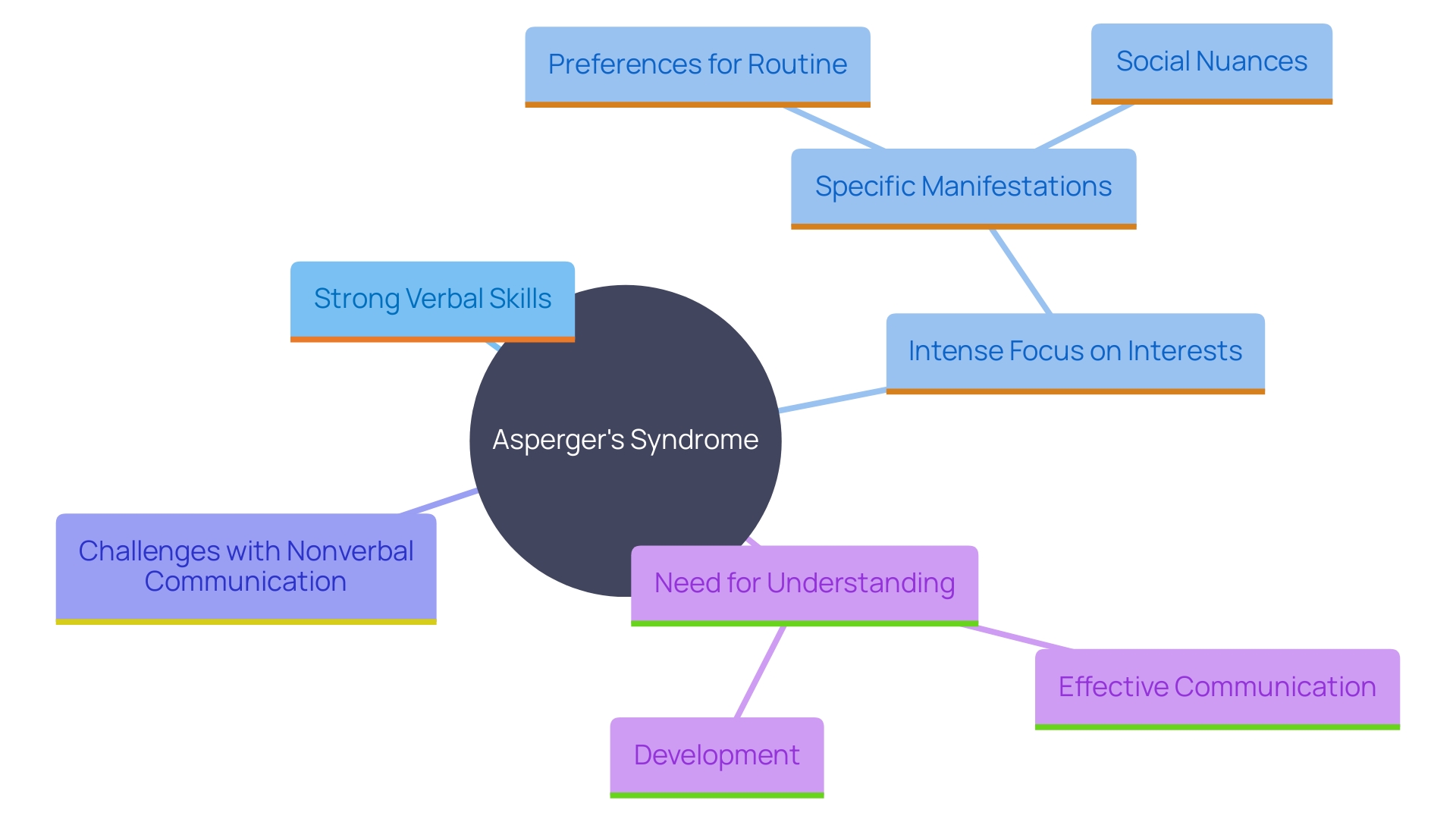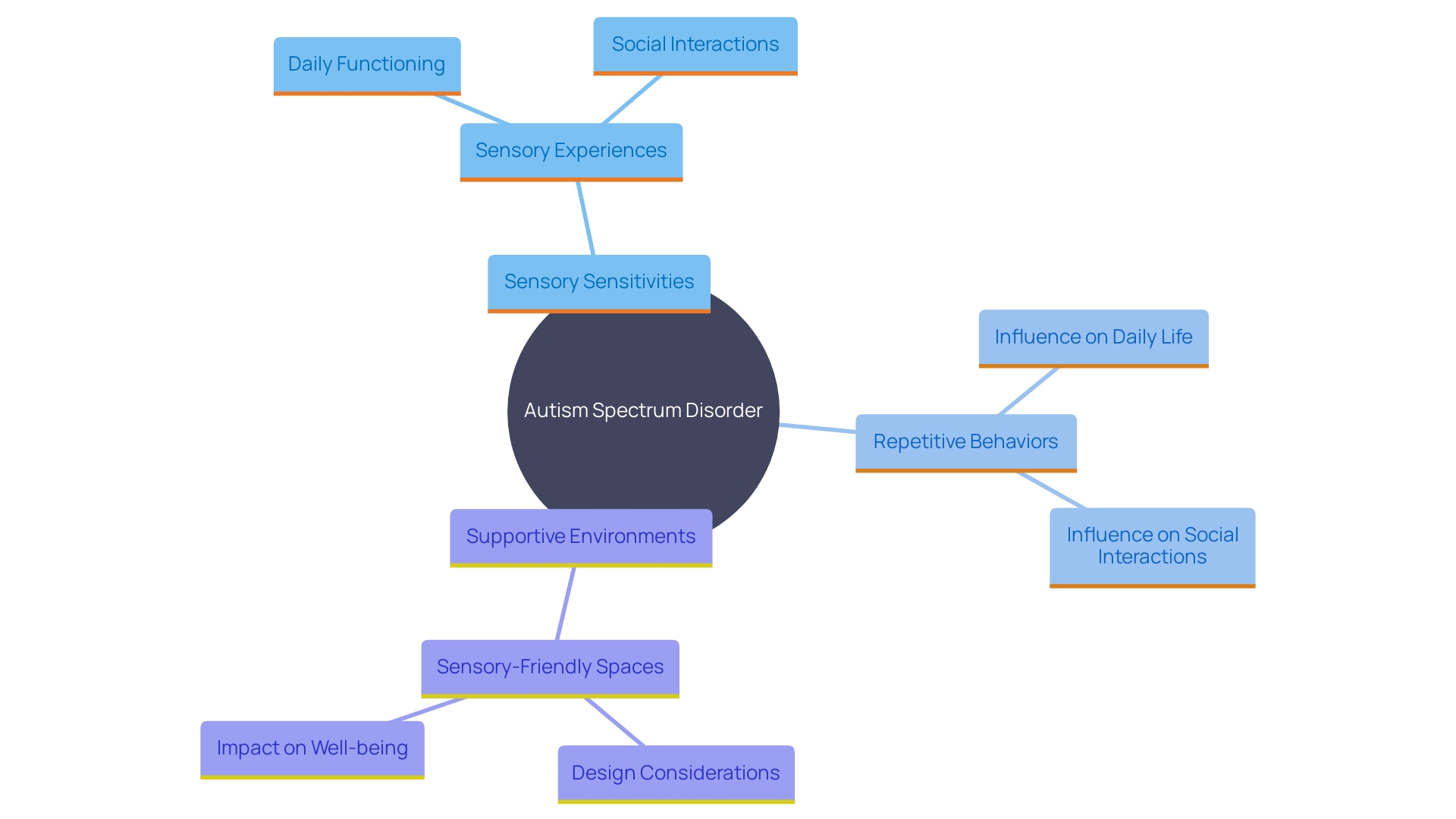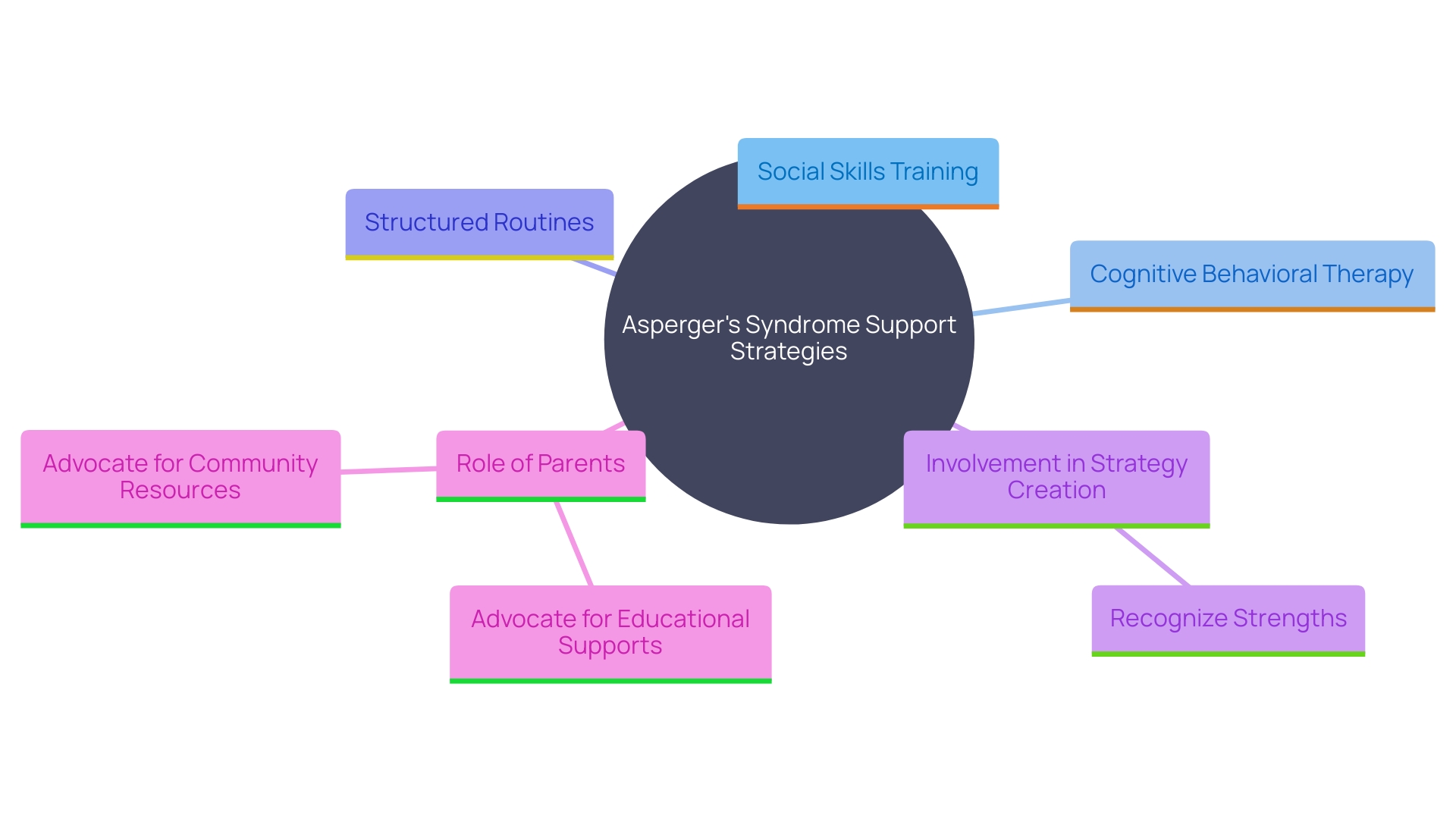Introduction
Navigating the complexities of Asperger's Syndrome can be a daunting task, but understanding its unique characteristics is a crucial first step. Asperger's Syndrome, a part of the autism spectrum, is marked by strong verbal skills and intense focus on specific interests, yet individuals often struggle with nonverbal communication and social interactions. These challenges can manifest in various forms, from a preference for routine to difficulties in interpreting social cues, making everyday interactions a significant hurdle.
Social interaction challenges are a core aspect of Asperger's, often leading to feelings of isolation. Recognizing and addressing these challenges can significantly improve the quality of life for those affected. Transitions to new environments can be particularly stressful, requiring additional support to facilitate smoother adjustments.
Sensory sensitivities and repetitive behaviors further complicate the daily experiences of individuals with Asperger's. Heightened reactivity to sensory inputs like sounds and lights can cause discomfort, while repetitive behaviors such as hand-flapping or intense focus on specific activities are common. Creating a sensory-friendly environment can alleviate anxiety and promote comfort.
Effective support strategies are essential for helping individuals with Asperger's thrive. Tailored interventions, such as social skills training and cognitive behavioral therapy, can address their unique needs and foster independence. Parents play a crucial role in advocating for appropriate supports and resources, ensuring their children have the opportunities to succeed.
Finally, fostering an inclusive and supportive environment is vital. Educating peers about Asperger's and promoting an atmosphere of understanding can greatly enhance emotional well-being and self-esteem. Engaging in inclusive activities and open dialogues about differences can help build meaningful connections and support mental health.
Key Characteristics of Asperger's
Asperger's Syndrome is characterized by distinct traits that set it apart from other autism spectrum disorders. Individuals often possess strong verbal skills and an intense focus on specific interests. However, they may face challenges with nonverbal communication cues, leading to difficulties in interpersonal interactions. These traits can manifest in various ways, such as a strong preference for routine, a deep focus on particular subjects, and struggles with understanding social nuances. For example, approximately one-third of people with autism, including those with Asperger's syndrome, are unable to communicate effectively using speech, despite interventions. This highlights the importance of recognizing and accommodating these unique communication needs. As Professor Vikram Jaswal from the University of Virginia emphasizes, underestimating nonspeaking autistic individuals' capacity for language and learning can severely limit their opportunities. Therefore, understanding and supporting these unique characteristics is crucial for their development and well-being.

Social Interaction Challenges
A key feature of Asperger's Disorder is the challenge in interpersonal interactions. Individuals often struggle with initiating conversations, interpreting body language, and engaging in reciprocal dialogue, which can lead to feelings of isolation and frustration. Recognizing these challenges is essential for parents and caregivers, as fostering social skills can significantly improve the quality of life for those with Asperger's. For instance, transitions to new environments, such as moving from school to a community-based program, can be particularly daunting due to unfamiliar settings and routines. Providing support during these transitions can help mitigate stress and promote smoother adjustments.
Dr. David (Dan) R. Offord, a renowned psychiatrist specializing in youth, emphasized the importance of equitable opportunities for all young individuals, including those with disabilities. He noted that ensuring children have the resources they need is fundamental to their mental health and overall well-being. This principle is particularly pertinent for individuals with Asperger's, who often encounter distinct interpersonal challenges. By understanding and addressing their needs, caregivers can help them navigate interpersonal interactions more effectively and build meaningful connections.
Research has also highlighted the impact of authentic versus posed smiles in interpersonal communication. Authentic smiles, which involve the tiny muscles around the eyes, are frequently viewed more favorably and can improve interactions with others. In contrast, posed smiles may not convey true emotions and can sometimes hinder communication. For people with autism, learning to identify and react to these subtle interpersonal signals can be especially difficult. However, with targeted support and intervention, they can develop better social understanding and improve their interactions with others.
Sensory Sensitivities and Repetitive Behaviors
Individuals with autism spectrum disorder often experience heightened sensory sensitivities, making them more reactive to sounds, lights, or textures. This can lead to discomfort in environments that others may find perfectly normal. Sensory sensitivities and the resulting discomfort are well-documented in research, which emphasizes the importance of creating supportive environments. For instance, a thematic synthesis by Thomas and Harden (2008) highlighted common sensory experiences of autistic individuals, revealing how these sensitivities impact their daily lives.
Repetitive behaviors, such as hand-flapping or intense focus on specific activities, are frequently observed in individuals with Asperger's. Recognizing these behaviors is crucial for parents, as it allows them to better understand their child's needs and provide appropriate support. According to the Comprehensive Guide on High Functioning Autism, these repetitive behaviors are a key characteristic of the disorder and can significantly influence social interactions and daily functioning.
Establishing a sensory-friendly atmosphere can greatly lessen anxiety and enhance comfort for people with sensory sensitivities. As one expert notes, 'Every design project is personal. Whether you're designing your own home or working for a client, you're creating a safe space, a comfort zone, a personalized haven.' This approach guarantees that the distinct sensory requirements of people on the spectrum are addressed, promoting a more inclusive and supportive environment.

Strategies and Interventions for Support
Effective assistance for people with Asperger's Syndrome involves tailored strategies that address their unique needs. Social skills training, cognitive behavioral therapy, and structured routines are essential components. Involving the person in the creation of these strategies not only empowers them but also promotes a sense of independence. According to the National Academies of Sciences, Engineering, and Medicine, recognizing both unmet needs and the strengths individuals bring to their communities is crucial for their well-being. Dr. David (Dan) R. Offord, a renowned psychiatrist specializing in youth, emphasized the importance of a fair environment, stating, "I do not mind if my children are in a race as long as the race is fair." This highlights the need for equitable participation and support systems for young individuals with disabilities. Parents play a pivotal role by advocating for appropriate educational supports and community resources, ensuring their offspring have the opportunities to thrive.

Creating an Inclusive and Supportive Environment
Establishing a welcoming atmosphere is essential for individuals with Autism Spectrum Disorder. This involves not only educating peers about the condition but also fostering an atmosphere of understanding and acceptance. A supportive environment can greatly enhance emotional well-being and self-esteem. Engaged, peaceful, and well-supported participation in school, home, and leisure activities is a fundamental determinant of mental health for youngsters with disabilities, including those with Asperger's. As Dr. David (Dan) R. Offord, a renowned child psychiatrist, once said, “I do not mind if my children are in a race as long as the race is fair.” This highlights the need for equity and fair opportunities in all aspects of life. Parents can play a pivotal role by encouraging open dialogues about differences and promoting friendships through inclusive recreational activities and social groups.
Conclusion
Understanding Asperger's Syndrome is essential for fostering an environment where individuals can thrive. The unique characteristics of this condition, including strong verbal skills and intense focus, come with challenges in social interactions and sensory sensitivities. Recognizing these traits is not just about awareness; it's about advocating for the necessary supports that can enhance communication and social understanding.
Social interaction challenges are a significant aspect of Asperger's, often leading to feelings of isolation. By implementing strategies that promote social skills and providing support during transitions, caregivers can help individuals navigate these hurdles more effectively. The importance of equitable opportunities, as highlighted by experts, cannot be overstated—ensuring that children have access to the resources they need is fundamental to their mental health and overall development.
Sensory sensitivities and repetitive behaviors further complicate daily experiences, making it crucial to create sensory-friendly environments. Tailoring spaces to accommodate these needs can greatly reduce anxiety and enhance comfort. Understanding and addressing these behaviors allows parents and caregivers to provide the appropriate support and foster a sense of belonging.
Ultimately, cultivating an inclusive and supportive environment is vital. Educating peers and promoting understanding can significantly improve emotional well-being and self-esteem for those with Asperger's Syndrome. By encouraging open dialogues and inclusive activities, parents and advocates can help build meaningful connections that enrich the lives of individuals with Asperger's, ensuring they have the opportunity to thrive in all aspects of life.




